2013 VOLKSWAGEN GOLF warning light
[x] Cancel search: warning lightPage 109 of 321
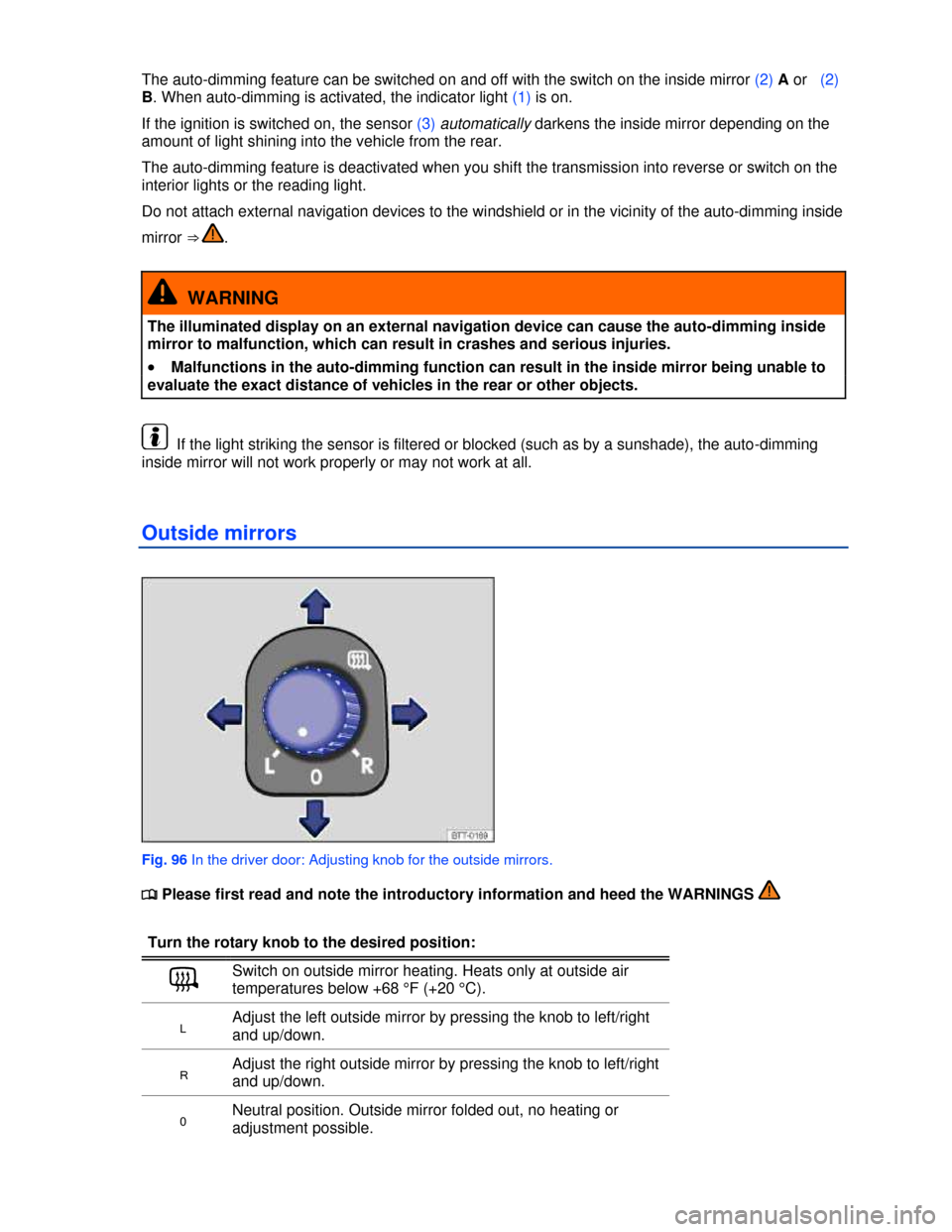
The auto-dimming feature can be switched on and off with the switch on the inside mirror (2) A or (2)
B. When auto-dimming is activated, the indicator light (1) is on.
If the ignition is switched on, the sensor (3) automatically darkens the inside mirror depending on the
amount of light shining into the vehicle from the rear.
The auto-dimming feature is deactivated when you shift the transmission into reverse or switch on the
interior lights or the reading light.
Do not attach external navigation devices to the windshield or in the vicinity of the auto-dimming inside
mirror ⇒ .
WARNING
The illuminated display on an external navigation device can cause the auto-dimming inside
mirror to malfunction, which can result in crashes and serious injuries.
�x Malfunctions in the auto-dimming function can result in the inside mirror being unable to
evaluate the exact distance of vehicles in the rear or other objects.
If the light striking the sensor is filtered or blocked (such as by a sunshade), the auto-dimming
inside mirror will not work properly or may not work at all.
Outside mirrors
Fig. 96 In the driver door: Adjusting knob for the outside mirrors.
�
Page 127 of 321
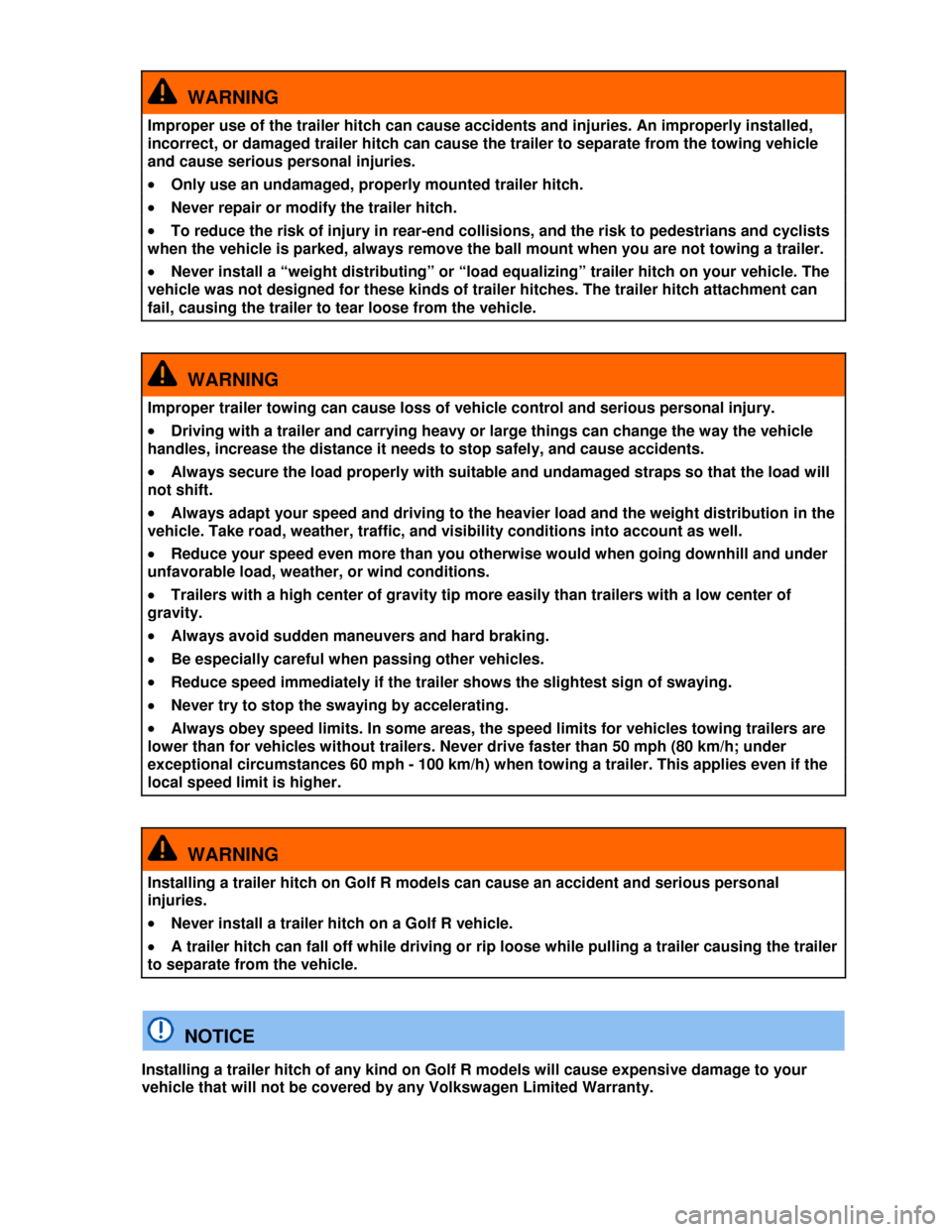
WARNING
Improper use of the trailer hitch can cause accidents and injuries. An improperly installed,
incorrect, or damaged trailer hitch can cause the trailer to separate from the towing vehicle
and cause serious personal injuries.
�x Only use an undamaged, properly mounted trailer hitch.
�x Never repair or modify the trailer hitch.
�x To reduce the risk of injury in rear-end collisions, and the risk to pedestrians and cyclists
when the vehicle is parked, always remove the ball mount when you are not towing a trailer.
�x Never install a “weight distributing” or “load equalizing” trailer hitch on your vehicle. The
vehicle was not designed for these kinds of trailer hitches. The trailer hitch attachment can
fail, causing the trailer to tear loose from the vehicle.
WARNING
Improper trailer towing can cause loss of vehicle control and serious personal injury.
�x Driving with a trailer and carrying heavy or large things can change the way the vehicle
handles, increase the distance it needs to stop safely, and cause accidents.
�x Always secure the load properly with suitable and undamaged straps so that the load will
not shift.
�x Always adapt your speed and driving to the heavier load and the weight distribution in the
vehicle. Take road, weather, traffic, and visibility conditions into account as well.
�x Reduce your speed even more than you otherwise would when going downhill and under
unfavorable load, weather, or wind conditions.
�x Trailers with a high center of gravity tip more easily than trailers with a low center of
gravity.
�x Always avoid sudden maneuvers and hard braking.
�x Be especially careful when passing other vehicles.
�x Reduce speed immediately if the trailer shows the slightest sign of swaying.
�x Never try to stop the swaying by accelerating.
�x Always obey speed limits. In some areas, the speed limits for vehicles towing trailers are
lower than for vehicles without trailers. Never drive faster than 50 mph (80 km/h; under
exceptional circumstances 60 mph - 100 km/h) when towing a trailer. This applies even if the
local speed limit is higher.
WARNING
Installing a trailer hitch on Golf R models can cause an accident and serious personal
injuries.
�x Never install a trailer hitch on a Golf R vehicle.
�x A trailer hitch can fall off while driving or rip loose while pulling a trailer causing the trailer
to separate from the vehicle.
NOTICE
Installing a trailer hitch of any kind on Golf R models will cause expensive damage to your
vehicle that will not be covered by any Volkswagen Limited Warranty.
Page 129 of 321
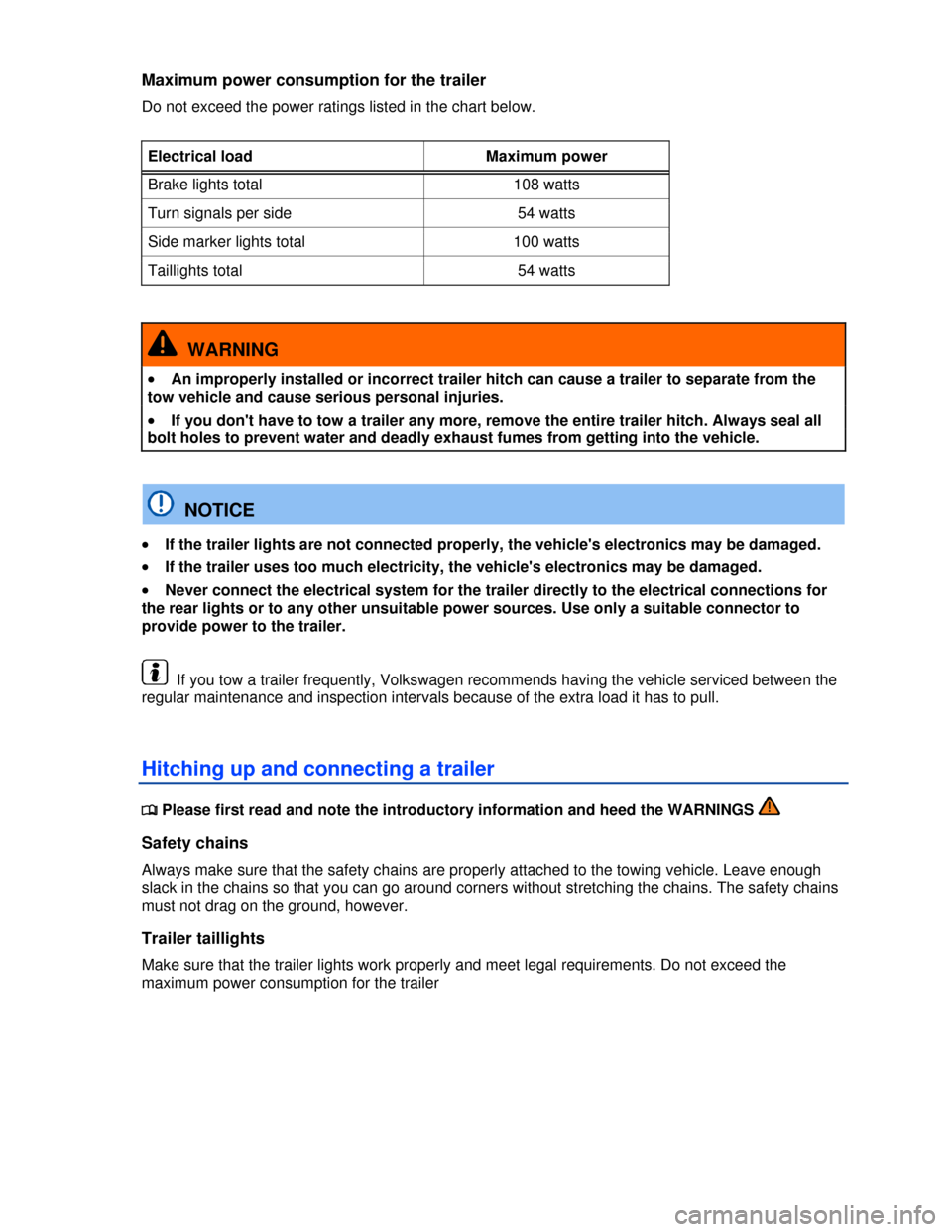
Maximum power consumption for the trailer
Do not exceed the power ratings listed in the chart below.
Electrical load Maximum power
Brake lights total 108 watts
Turn signals per side 54 watts
Side marker lights total 100 watts
Taillights total 54 watts
WARNING
�x An improperly installed or incorrect trailer hitch can cause a trailer to separate from the
tow vehicle and cause serious personal injuries.
�x If you don't have to tow a trailer any more, remove the entire trailer hitch. Always seal all
bolt holes to prevent water and deadly exhaust fumes from getting into the vehicle.
NOTICE
�x If the trailer lights are not connected properly, the vehicle's electronics may be damaged.
�x If the trailer uses too much electricity, the vehicle's electronics may be damaged.
�x Never connect the electrical system for the trailer directly to the electrical connections for
the rear lights or to any other unsuitable power sources. Use only a suitable connector to
provide power to the trailer.
If you tow a trailer frequently, Volkswagen recommends having the vehicle serviced between the
regular maintenance and inspection intervals because of the extra load it has to pull.
Hitching up and connecting a trailer
�
Page 130 of 321
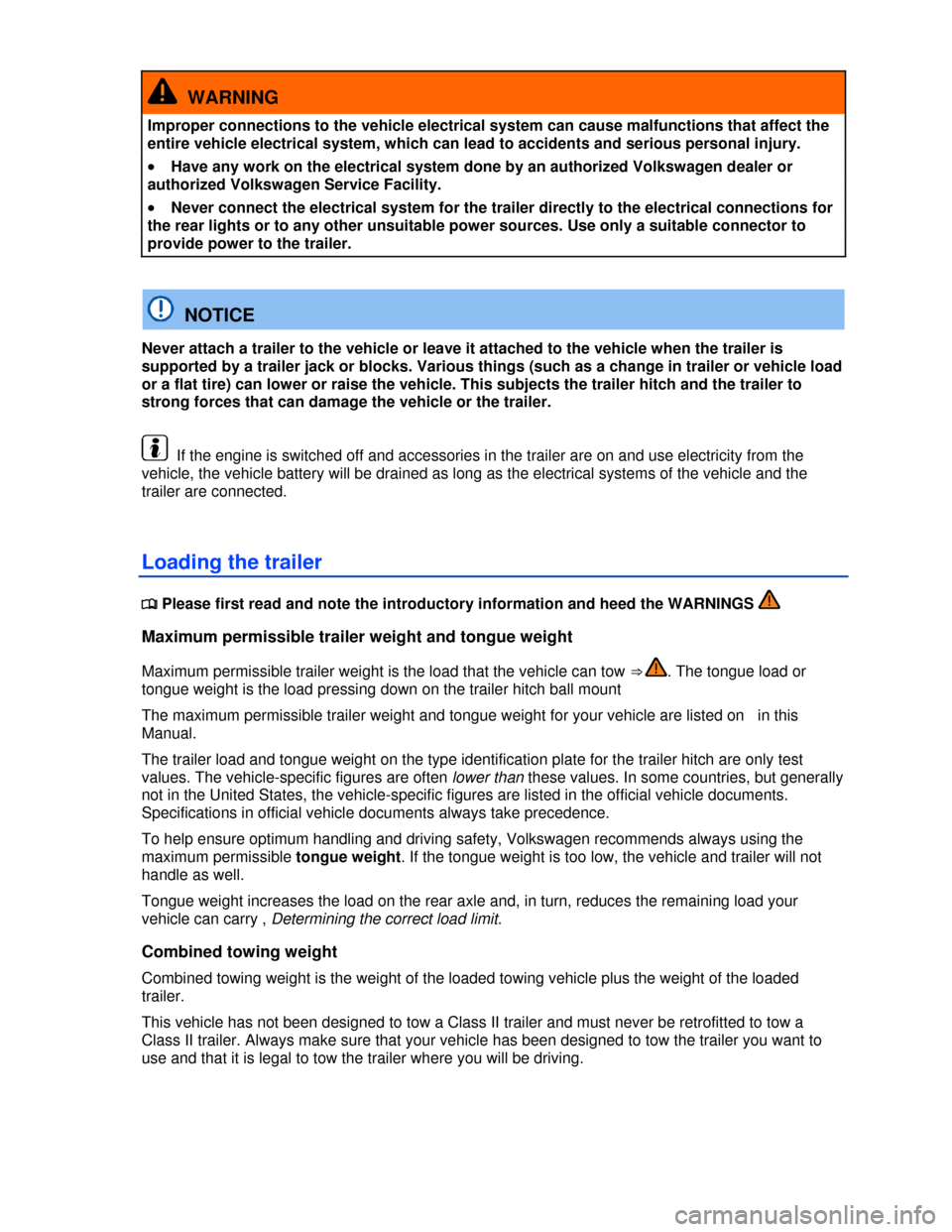
WARNING
Improper connections to the vehicle electrical system can cause malfunctions that affect the
entire vehicle electrical system, which can lead to accidents and serious personal injury.
�x Have any work on the electrical system done by an authorized Volkswagen dealer or
authorized Volkswagen Service Facility.
�x Never connect the electrical system for the trailer directly to the electrical connections for
the rear lights or to any other unsuitable power sources. Use only a suitable connector to
provide power to the trailer.
NOTICE
Never attach a trailer to the vehicle or leave it attached to the vehicle when the trailer is
supported by a trailer jack or blocks. Various things (such as a change in trailer or vehicle load
or a flat tire) can lower or raise the vehicle. This subjects the trailer hitch and the trailer to
strong forces that can damage the vehicle or the trailer.
If the engine is switched off and accessories in the trailer are on and use electricity from the
vehicle, the vehicle battery will be drained as long as the electrical systems of the vehicle and the
trailer are connected.
Loading the trailer
�
Page 132 of 321
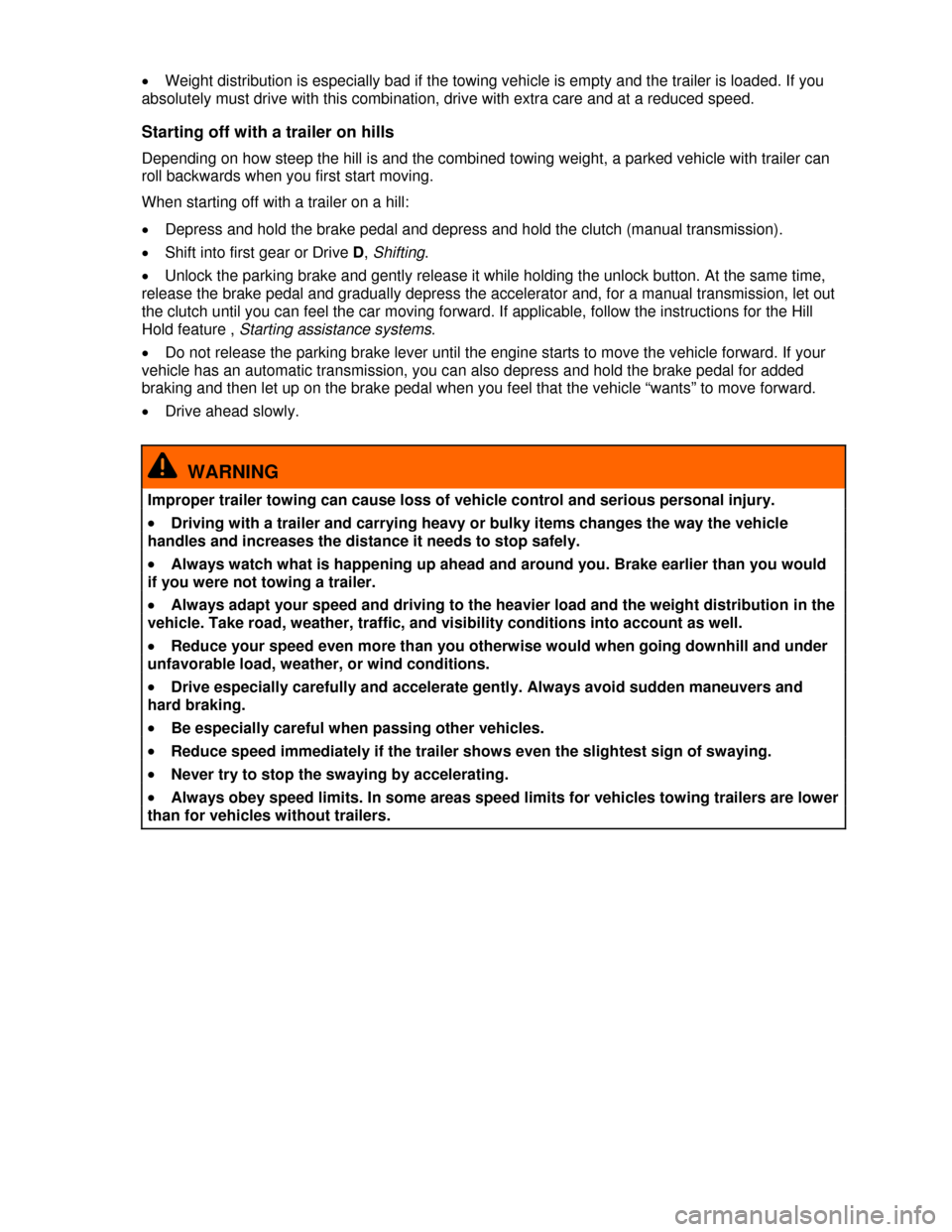
�x Weight distribution is especially bad if the towing vehicle is empty and the trailer is loaded. If you
absolutely must drive with this combination, drive with extra care and at a reduced speed.
Starting off with a trailer on hills
Depending on how steep the hill is and the combined towing weight, a parked vehicle with trailer can
roll backwards when you first start moving.
When starting off with a trailer on a hill:
�x Depress and hold the brake pedal and depress and hold the clutch (manual transmission).
�x Shift into first gear or Drive D, Shifting.
�x Unlock the parking brake and gently release it while holding the unlock button. At the same time,
release the brake pedal and gradually depress the accelerator and, for a manual transmission, let out
the clutch until you can feel the car moving forward. If applicable, follow the instructions for the Hill
Hold feature , Starting assistance systems.
�x Do not release the parking brake lever until the engine starts to move the vehicle forward. If your
vehicle has an automatic transmission, you can also depress and hold the brake pedal for added
braking and then let up on the brake pedal when you feel that the vehicle “wants” to move forward.
�x Drive ahead slowly.
WARNING
Improper trailer towing can cause loss of vehicle control and serious personal injury.
�x Driving with a trailer and carrying heavy or bulky items changes the way the vehicle
handles and increases the distance it needs to stop safely.
�x Always watch what is happening up ahead and around you. Brake earlier than you would
if you were not towing a trailer.
�x Always adapt your speed and driving to the heavier load and the weight distribution in the
vehicle. Take road, weather, traffic, and visibility conditions into account as well.
�x Reduce your speed even more than you otherwise would when going downhill and under
unfavorable load, weather, or wind conditions.
�x Drive especially carefully and accelerate gently. Always avoid sudden maneuvers and
hard braking.
�x Be especially careful when passing other vehicles.
�x Reduce speed immediately if the trailer shows even the slightest sign of swaying.
�x Never try to stop the swaying by accelerating.
�x Always obey speed limits. In some areas speed limits for vehicles towing trailers are lower
than for vehicles without trailers.
Page 136 of 321
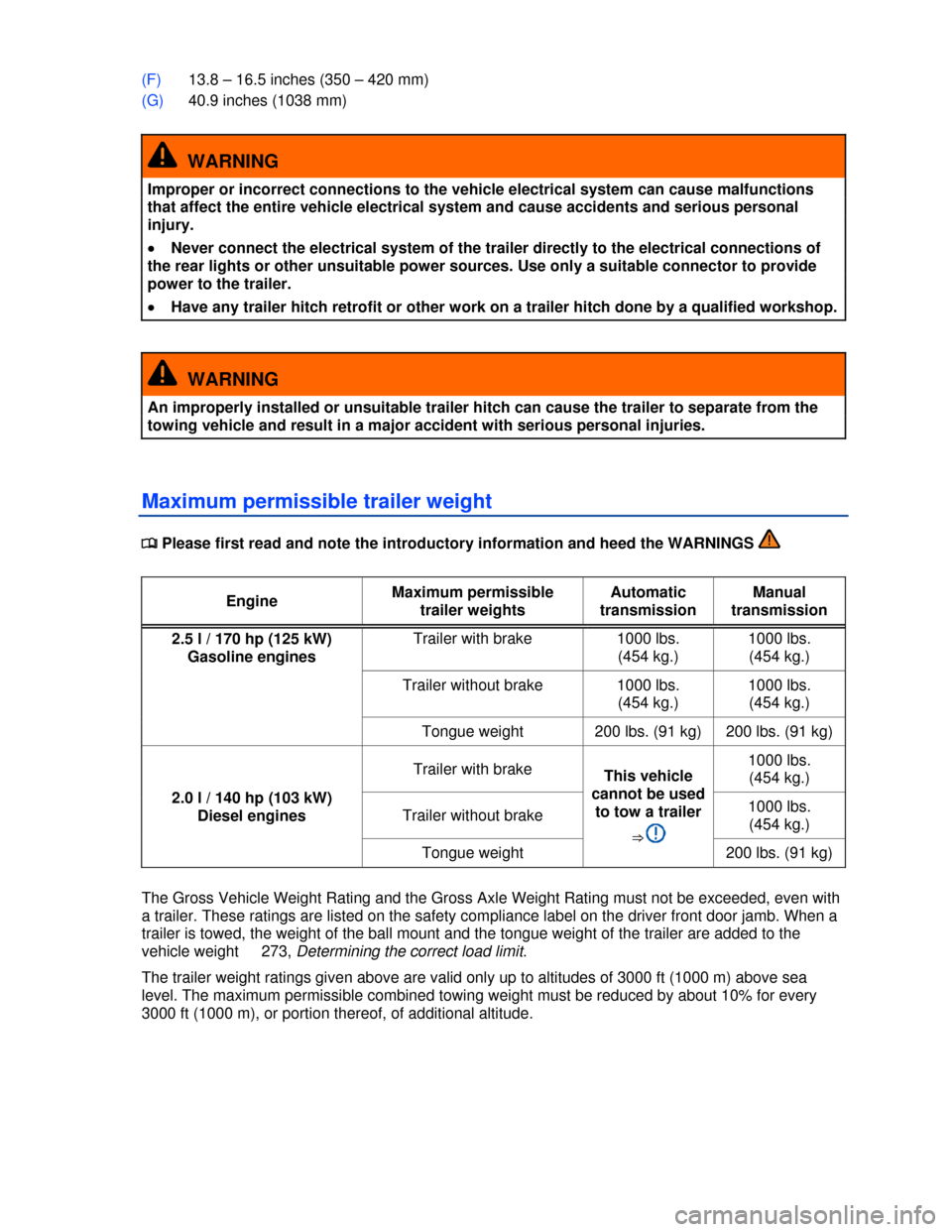
(F) 13.8 – 16.5 inches (350 – 420 mm)
(G) 40.9 inches (1038 mm)
WARNING
Improper or incorrect connections to the vehicle electrical system can cause malfunctions
that affect the entire vehicle electrical system and cause accidents and serious personal
injury.
�x Never connect the electrical system of the trailer directly to the electrical connections of
the rear lights or other unsuitable power sources. Use only a suitable connector to provide
power to the trailer.
�x Have any trailer hitch retrofit or other work on a trailer hitch done by a qualified workshop.
WARNING
An improperly installed or unsuitable trailer hitch can cause the trailer to separate from the
towing vehicle and result in a major accident with serious personal injuries.
Maximum permissible trailer weight
�
Page 145 of 321

�x Luggage compartment cover behind the rear seat backrest – only for light clothing or similar
objects that do not interfere with visibility to the rear!
�x Coat hooks on the center door pillars (four-door vehicles only) and the overhead grab handles in
the rear.
WARNING
Clothes or other items on the luggage compartment cover behind the rear seat backrest may
limit visibility and cause accidents and severe personal injuries.
�x Always hang clothes so that they do not limit visibility.
�x Always use the built-in coat hooks only for lightweight clothing. Never leave any heavy or
sharp-edged items in the pockets that may interfere with airbag deployment and can cause
personal injury in a collision.
Page 152 of 321
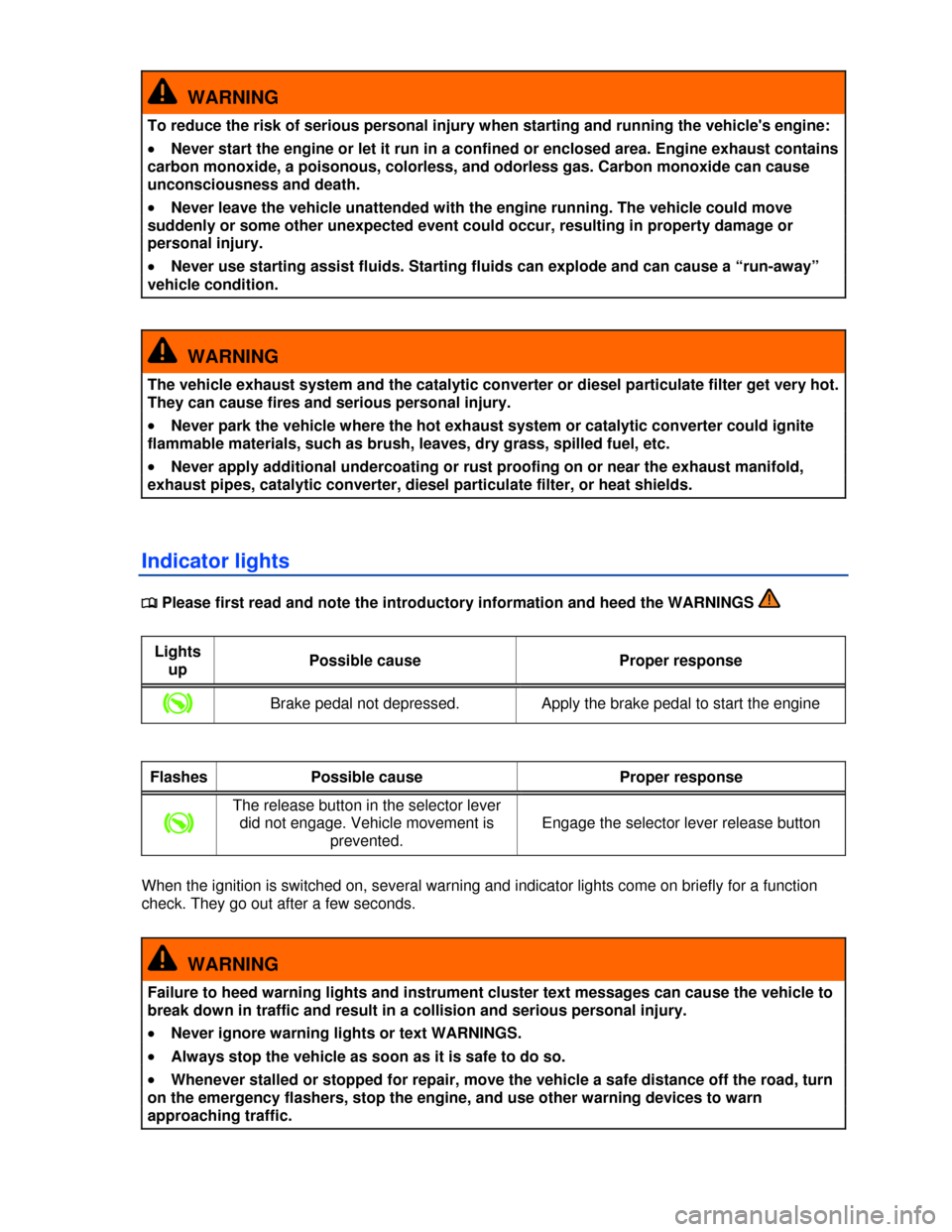
WARNING
To reduce the risk of serious personal injury when starting and running the vehicle's engine:
�x Never start the engine or let it run in a confined or enclosed area. Engine exhaust contains
carbon monoxide, a poisonous, colorless, and odorless gas. Carbon monoxide can cause
unconsciousness and death.
�x Never leave the vehicle unattended with the engine running. The vehicle could move
suddenly or some other unexpected event could occur, resulting in property damage or
personal injury.
�x Never use starting assist fluids. Starting fluids can explode and can cause a “run-away”
vehicle condition.
WARNING
The vehicle exhaust system and the catalytic converter or diesel particulate filter get very hot.
They can cause fires and serious personal injury.
�x Never park the vehicle where the hot exhaust system or catalytic converter could ignite
flammable materials, such as brush, leaves, dry grass, spilled fuel, etc.
�x Never apply additional undercoating or rust proofing on or near the exhaust manifold,
exhaust pipes, catalytic converter, diesel particulate filter, or heat shields.
Indicator lights
�